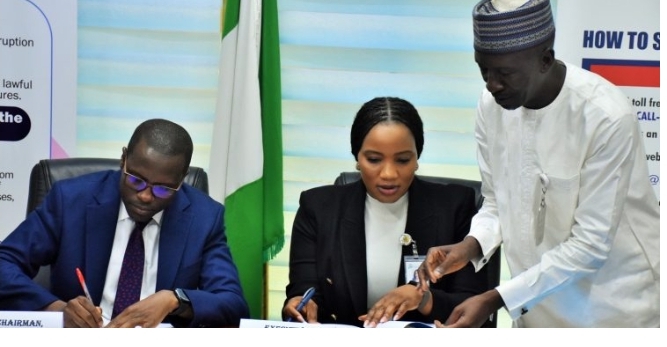The Pension Transitional Arrangement Directorate (PTAD) has signed a Memorandum of Understanding (MoU) with the Independent Corrupt Practices and Other Related Offences Commission (ICPC) to jointly combat corruption in the administration of the Defined Benefit Pension Scheme (DBS).
Olugbenga Ajayi Head, Corporate Communications Unit in a statement on Tuesday, said the MoU was signed by the Executive Secretary of PTAD, Tolulope Odunaiya, and the Chairman of ICPC, Dr. Musa Adamu Aliyu, San as part of efforts to promote transrency d accountability.
Ajayi said “This legal document provides a framework for collaboration between both institutions in monitoring, investigating, and preventing corrupt practices within the DBS pension system”.
In her remarks, PTAD Executive Secretary, Tolulope Odunaiya noted that, “the MOU reflects our shared determination to combat pension corruptionwithin the DBS, uphold integrity, and advance transparency and accountability within our respective mandates, while ensuring the delivery of good governance to every pensioner and stakeholder.”
She added “By leveraging our combined strengths, we can significantly enhance our capacity to prevent, detect, and prosecute corruption-related offenses in the DBS pension system, which is in line with His Excellency, President Bola Ahmed Tinubu’s Renewed Hope Agenda”.
Similarly, the ICPC Chairman, Dr. Musa Adamu Aliyu, SAN, further emphasized that, “joining forces with PTAD is a strong step toward curbing corrupt practices in the administration of the Defined Benefit Pension Scheme.
The ICPC boss noted “By combining PTAD’s robust and increasingly digitised database with the investigative and prosecutorial powers of the ICPC, we are creating a seamless and powerful force.”
He also commended the Executive Secretary for her unwavering commitment towards the fight against corruption in the Federal Government Defined Benefit Pension Scheme.
Aliyu further stated that the partnership underscores the shared mandate of PTAD and ICPC to promote good governance, strengthen accountability, and safeguard Nigerians’ welfare from fraudulent practices.”

